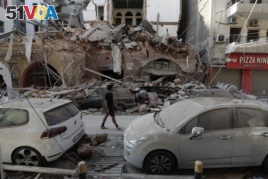05 August 2020
Lebanese officials say ammonium nitrate, a substance used as fertilizer in agriculture, likely caused the massive explosion in Beirut.
The explosion killed at least 100 people and injured more than 4,000 others on Tuesday. It flattened much of the port and damaged buildings across the capital city.
Lebanon's President Michel Aoun said more than 2,700 tons of ammonium nitrate had been stored without safety measures for six years at the port. He added the government was "determined to investigate and expose what happened as soon as possible."
In agriculture, ammonium nitrate fertilizer is released into the soil to help plant growth. Under normal conditions, the substance does not explode easily.
Explosives experts say the Beirut explosion was likely caused by a fire at a storage of fireworks nearby.
Boaz Hayoun works closely with the Israeli government on safety and issues involving explosives. He told the Associated Press, "Before the big explosion, you can see in the center of the fire, you can see sparks, you can hear sounds like popcorn and you can hear whistles."
Hayoun said those are common signs of the burning of fireworks.
Jeffrey Lewis, a missile expert at the Middlebury Institute of International Studies in Monterey, California, agreed. He said, "If you have a fire raging next to something explosive, and you don't put it out, it blows up."

Destruction is seen after a massive explosion in Beirut, Lebanon, Wednesday, Aug. 5, 2020.
Previous explosions
Ammonium nitrate has caused several earlier industrial explosions in countries including Germany, the United States and China.
In 1921, a massive explosion involving ammonium nitrate at a chemical plant killed more than 500 people in Oppau, Germany.
And, in 1947, a burning cigarette caused an explosion in Galveston, Texas as workers were loading the fertilizer into a ship. It killed 581 people and injured 3,500.
More recently, 173 people were killed at a factory in Tianjin, China. That 2015 explosion involved ammonium nitrate and other chemicals. Witnesses to the event said it felt like an "atomic bomb" had hit.
Ammonium nitrate has also been used in terrorist acts in the United States.
A truck filled with the fertilizer exploded in New York City in 1993 at the World Trade Center. Kuwait-born Ramzi Yousef was found guilty of the bombing and is serving a life sentence in a U.S. prison.
On April 19, 1995, Timothy McVeigh, a former American soldier, left a truck in front of a federal office building in Oklahoma City, Oklahoma. Inside the truck was a powerful bomb made out of fertilizer, fuel and other chemicals. McVeigh exploded the bomb killing 168 people.
For these reasons, ammonium nitrate is a tightly controlled substance. Most countries bar its storage in areas near fuel and sources of heat. Much of the European Union also requires that calcium carbonate be added to ammonium nitrate because it makes the fertilizer less likely to explode. The United States strengthened its rules on storage and use of the substance after the Oklahoma City attack.
Despite its dangers, Jimmie Oxley, a chemistry professor at the University of Rhode Island, said the use of ammonium nitrate is necessary as fertilizer for farming and as an explosive.
She told the French news agency AFP, "We wouldn't have this modern world without explosives, and we wouldn't feed the population we have today without ammonium nitrate fertilizer."
"We need ammonium nitrate, we just need to pay good attention to what we're doing with it," she said.
I'm Mario Ritter, Jr.
Hai Do wrote this story for Learning English with additional reporting from the Associated Press and Agence France-Presse. Caty Weaver was the editor.
________________________________________________________
Words in This Story
determine - v. to officially decide something because of evidence or facts
expose - v. to reveal something
spark - n. a short bright flash of burning material
popcorn - n. corn in the form of yellow seed that burst open when heated
rage - v. to happen in a destructive or intense way
cigarette - n. a small roll of paper that is filled with tobacco and smoked